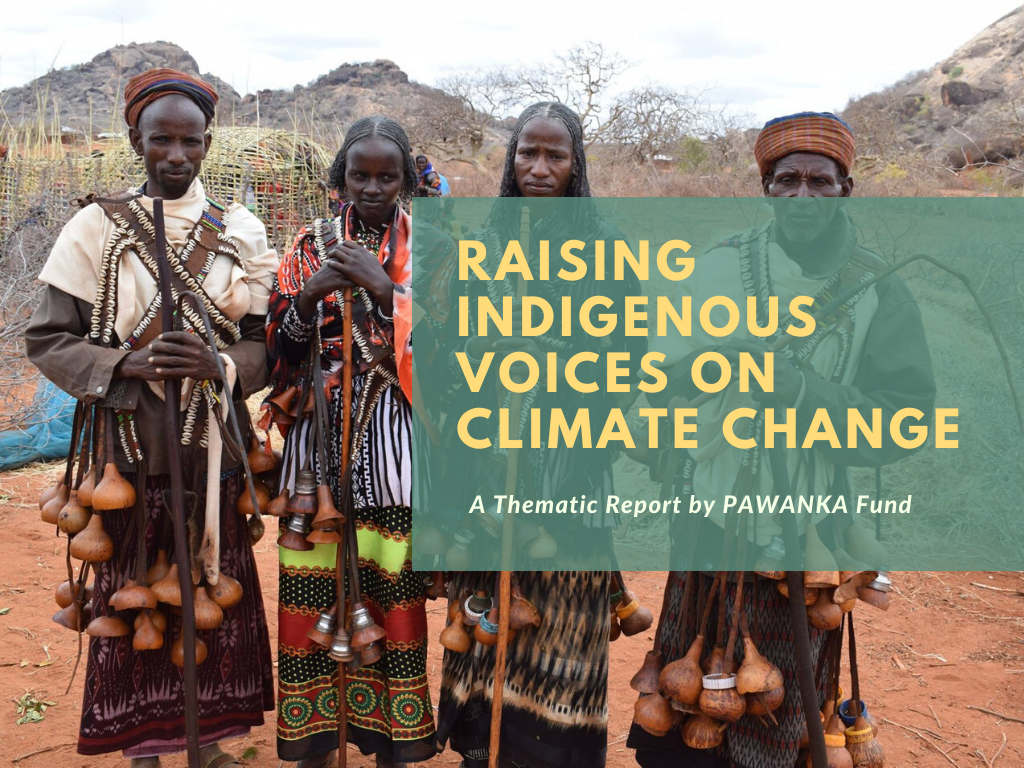
A Thematic Report by PAWANKA Fund
INTRODUCTION
There has been a worldwide surge of environmental activism in preparation for the annual United Nations gathering on climate crisis in December 2019. The climate strike led by Greta Thunburg is gaining more support and attention as youth pour out onto the streets alongside environmental activists and ordinary citizens demanding decisive global actions at all levels for climate justice.
Amazon forests are ablaze as a result of deliberate fires targeting the territory of Brazil’s indigenous peoples, including uncontacted tribes, to clear forests for commercial development and livestock agriculture. Forest fires in Africa and widespread haze caused by fires in Indonesia, all occurring largely in indigenous areas, have reached alarming levels yet do not attract much media attention.
Undoubtedly, indigenous peoples are at the forefront of the movement to combat climate change. They have the smallest contribution to this global crisis, yet they are disproportionately affected by the adverse impacts of climate change.
In their latest report in August, the Intergovernmental Panel on Climate Change (IPCC), composed of scientists and experts, acknowledged the critical contributions of indigenous peoples and specifically affirmed that the recognition of indigenous peoples’ rights is needed for climate crisis solutions. Mounting evidence shows that, for generations, indigenous peoples have been protecting different types of ecosystems – forest, mountains, tundra, water bodies, and others – as well as the biodiversity within them. The continuation of this protection is thus critical in addressing climate change.
The unquestionable role of indigenous peoples in adapting to and mitigating the impacts of climate change has yet to be fully appreciated, and their sustainable practices and use of indigenous knowledge must be included as viable solutions for climate change. It is high time that policy makers, opinion influencers, the private sector, and other stakeholders listen to indigenous peoples to save the only planet we all depend upon. The holistic and sustainable interaction and reciprocal relationship between indigenous peoples and their environment have made indigenous territories a safety net for a world in peril. Yet, their lands and resources are being grabbed and destroyed, largely for business, and their survival as distinct peoples is endangered. Thus, the collective rights of indigenous peoples – particularly to their lands and resources – need to be secured and protected as a key solution for climate change. It is in this framework that indigenous peoples fully become central actors in addressing the global crisis of climate change.
The PAWANKA Fund (Indigenous Ways of Knowing and Learning) contributes to effective solutions to the climate crisis. It directly supports indigenous peoples organizations’ frontline efforts to strengthen indigenous resilience in the face of climate change. Indigenous peoples are struggling at the last frontiers, seeking to cushion the impacts of climate change and to protect these places from irrevocable damage. Around the globe, indigenous peoples are showing the world’s citizens how indigenous customs and practices are proofs of sustainable resource uses that also conserve and protect the environment. As traditional guardians of forests and other ecosystems, they demonstrate customary practices of forest and resource management for present and future generations. This approach is the complete antithesis of the capitalist paradigm of extraction and wholesale exploitation for profit, a key driver of climate change, inequality, and unsustainable development.
Pawanka Fund supported projects in Kenya (Africa), Cambodia and the Philippines (Asia), El Salvador (Central America), in the Russian Republic of Altai (Central Asia), the Menominee nation in the United States (North America), and the Marshall Islands (Pacific) to demonstrate indigenous-led initiatives to effectively address climate change. They all prove the crucial role of indigenous communities in climate stabilization, propagation of adaptation practices, and perpetuation of traditional knowledge and wisdom.
Pawanka Fund supported projects in Kenya (Africa), Cambodia and the Philippines (Asia), El Salvador (Central America), in the Russian Republic of Altai (Central Asia), the Menominee nation in the United States (North America), and the Marshall Islands (Pacific) to demonstrate indigenous-led initiatives to effectively address climate change. They all prove the crucial role of indigenous communities in climate stabilization, propagation of adaptation practices, and perpetuation of traditional knowledge and wisdom.
In centering these local responses to climate change, we hope that their initiatives can be fully appreciated, not only as cost-effective measures and enhancements of carbon sequestration, but as the means to strengthen solidarity and cooperation and strengthen nurturing connections with our planet.
